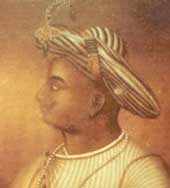|
|
The sword of Tipu Sultan cost Vijay Mallya a cool Rs 1.5 crore. A worthy sum for an object of unique historical significance, don’t you think? One of the many reasons why we preserve our heritage is that these remnants of history are the “real thing” — they were actually used by historical characters, and hold a special value in being the only remains of a time gone by and of heroes of another time.
Srirangapatnam, outside the present city of Mysore, is one such place. Here Tipu Sultan built his summer palace, called the Dariya Daulat or “splendours of the sea”, in the year 1784. The palace stands in a formal garden with lush quiet surroundings. The building itself is of an elegant and neat design, with a huge sloping roof. The walls of the palace are elaborately painted with panels and decorative motifs. On one wall is a huge mural of a procession with Hyder Ali and his son, Tipu, on horseback.
To walk in this garden and to roam in the palace are an extraordinary experience. For you know for sure that you are walking in the footsteps of a real hero, you are seeing what Tipu saw, you are partaking in his pleasure at the summer palace, the place where he went to rest during his long and energetic life. That is what the conservation of our heritage gives to us — it makes our lives richer because we can experience, in the original, the remnants of an irreplaceable time in the history of the world.
The Archaeological Survey of India protects the Dariya Daulat as a national monument and has converted the palace into a museum to Tipu Sultan. There are portraits and personal belongings of Tipu and his family. There are pieces of furniture, some of French origin, rich tapestries and coverlets. Upstairs there are portraits of members of Tipu’s family, including his young and handsome but unfortunate sons. There are scenes from the storming of Srirangapatnam, the fall of Tipu and the imprisonment of his sons, which remind us of the fate of Tipu and the reasons why he is a historical hero for many.
Not far from the summer palace, where the fragrance of the past still lingers and reminds one of the days of pleasure and beauty, is the site of Tipu’s last battle and where he was laid to rest.
Die like a soldier
Tipu’s father, Hyder Ali of Mysore, fought the advancing British armies in an effort to protect his kingdom. When he died, Tipu continued the battle to save his land and people. While all other rulers in the region soon surrendered to British pressure, Tipu held his own and battle followed battle. Lord Wellesley, the British governor general, sought to buy control over Indian territory through his policy of subsidiary alliances, but Tipu refused to comply.
“Better to die like a soldier than live as a miserable dependent on the infidels,” Tipu is said to have sworn. He allied with the French in an attempt to defeat and ward off the British armies. Finally on May 4, 1799, on a hot summer day not unlike today, the British stormed the fort of Srirangapatnam and Tipu met his end, fighting like a soldier. A simple gravestone marks the place where Tipu was wounded and found dead.
Duke Wellington wrote about the massacre that followed: “Nothing therefore can exceed what was done on the night of the 4th. Scarcely a house in the town was left unplundered, and I understand that in (our) camp, jewels of the greatest value, bars of gold… have been offered for sale…”
While over 200 years have passed since that fateful May 4, Tipu’s palace remains serene and calm for all to visit, even as some, for their personal pleasure, continue to buy and sell Tipu’s sword and “jewels of the greatest value”.











